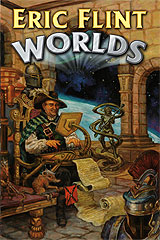
As an author, I'm almost a pure novelist. By good fortune, I happened to become a professional writer at a time when the market for science fiction and fantasy had become completely dominated by novels—and series, at that, not even stand-alone novels. That worked very nicely for me personally, since novels—especially series—are my natural inclination as a writer.
But that's not really why I work almost entirely in long-form writing, it's just good luck. I'd have done the same thing forty or fifty years ago when science fiction and fantasy was a predominantly short-form genre. Even though, in all likelihood, I'd never have been able to make a living as a writer, which I can do today.
It's just the way my brain works, that's all. When I first started writing fiction, like most aspiring authors, I tried to write short fiction. That's because I thought that it'd be much easier to get professionally published with short stories than with novels.
That's not actually true, today, as I discovered soon enough. If anything, there's less competition for novels than there is for short fiction. True enough, a typical novel publishing house will receive hundreds of manuscripts from unpublished authors every year, from which they will only select a literal handful. But a major commercial F&SF magazine will get that many submissions every month—from which they will select perhaps one or two from unpublished authors, if they select any at all.
The big drawback to launching a writing career with novels, or trying to, isn't actually the level of competition. It's that an aspiring writer obviously has to commit a far greater amount of time and effort to writing a novel than a short story. You can write a short story in days. Writing a novel, for all but the very fastest writers, takes several months—and can easily take a year or two, if you're working a full-time job.
The problem I always had with short fiction is that I simply couldn't start telling a story until I'd gotten the setting and background very well worked out. And once I'd done that and started writing, I invariably found myself writing a "short story" that was actually a novel in disguise—and would work far better as a novel in the first place. The only exceptions were a few short stories I wrote with a purely humorous purpose.
So, finally, I accepted the inevitable. I stopped trying to write short fiction and concentrated instead entirely on writing novels. And that's how my career got started. I'd published five novels and had several more under contract before I even tried to write short fiction again.
The reason I did, then, was because David Drake commissioned me to write a novella for an anthology (Foreign Legions, published in 2001) that was based in his Ranks of Bronze setting. Any professional writer hates to turn down work, following the principle that a bird in the hand is worth two in the bush. So, despite my misgivings, I accepted the commission.
At that point, an interesting thing happened. I discovered that I didn't have any trouble writing that novella—"Carthago Delenda Est," which is included in this volume—because David had already developed the setting and background. I found it quite easy to situate myself in an existing universe and simply figure out a story that would work just fine, despite being much shorter than my normal inclination.
A short time later, David Weber commissioned another story from me, this one to be included in an anthology of stories set in the universe of his very popular Honor Harrington series. In this instance, Dave wanted either a long novella or a short novel, not the short novella that Drake had commissioned.
The end result turned out to be the short novel "From the Highlands," which is also included in this volume. And, again, I made the same discovery. As long as the setting was already established, I had no trouble writing in any length from short story on up. Within a couple of years, I'd written several other pieces, most of them set in my own 1632 universe—the shortest of which is only three thousand words long. (That's "Portraits," also included herein.)
Once the logjam got broken, I wound up writing quite a bit of short fiction. Not as much, to be sure, as I wrote novels. But, eventually, I realized that I'd written enough short fiction to produce, if collected together, a very hefty anthology. So I proposed to Jim Baen that Baen Books produce such an anthology, and he accepted.
The result, you hold in your hand. This is something of an oddball collection of short fiction, I admit. The typical such collection is of a number of unrelated short stories, each of which stands entirely on its own. Whereas almost all of my short fiction is set in an existing universe—usually a series of my own, but sometimes that of another author—and many of the stories are related more directly still to novels or other stories in that series.
Still, I think every one of these stories can be read and enjoyed on its own. And it's my hope, of course, that if any reader of this anthology finds their interest being taken by one or another of the stories in it, they'll be inspired to investigate the novels in which that universe or universes are more fully developed.
So, welcome to my worlds.
Eric Flint
September 2008